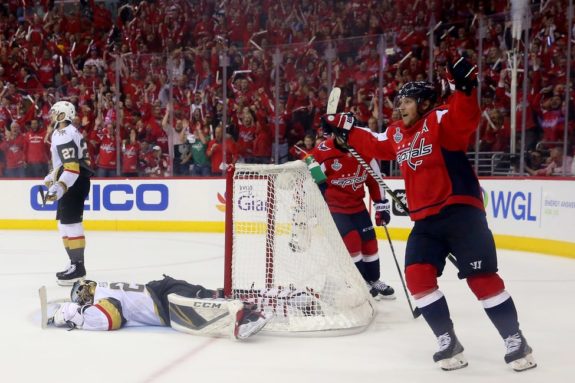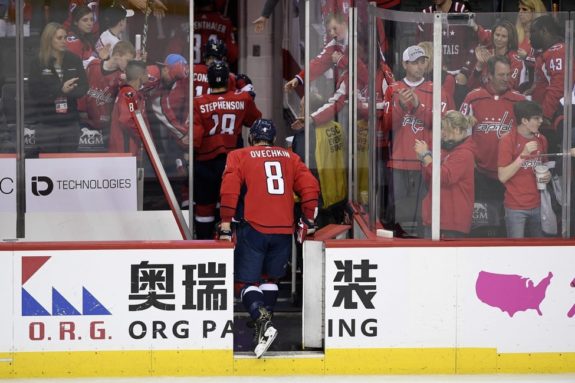When Washington Capitals fans last saw their team at Capital One Arena on March 4, they certainly didn’t think it would be the last time they’d see them in the calendar year 2020. But as the 2019-20 NHL season was paused for the COVID-19 outbreak, the timing of the return of any fans to Capital One Arena is still very unclear.
In a normal NHL season, the Capitals would just now be returning back to Washington after their annual road swing through western Canada as the Washington Horse Show vacates Capital One Arena.
Just one year ago Tuesday, the Capitals were hosting the Calgary Flames, and more memorably, hosting the 2019 World Series Champion Washington Nationals in an event few fans who attended would forget.
But this year, there was no grueling road trip to Edmonton, Calgary and Vancouver, there no horse show taking up residence at the arena, and as of yet, not even a new NHL schedule to come by.

So, when can Capitals fan realistically expect to be able to take in an NHL game at Capital One Arena? Like everything, this question is complicated, and has several different factors.
The NHL Issue
First of all, the NHL itself is looking to figure out how this next season will like. According to ESPN, the latest news is the league is realistically looking at a 68- to 48-game schedule, the latter number of games which was used during both the 1994-95 and 2012-13 lockout-shortened seasons — it is probably considered the bare minimum of games to hold a regular season.
While officially a full 82-game schedule is preferred by the league, with training camps not yet even given a start date, that seems unrealistic to fit in whatever time frame the league has to hold its season. A stated Jan. 1 start date eyed by the league, at least officially, means whatever schedule comes out will have to wrap up by July 23, limiting the NHL’s options on the number of games.
Why July 23? Well, the NHL’s primary U.S. rights holder, NBC, is scheduled to begin showing the rescheduled 2020 Tokyo Olympics, and it’s unlikely the NHL would get any U.S. traction trying to go up against the games, nor would NBC likely give a lot of broadcast space to the league against one of the top-rated sporting events globally.
So, the NHL most likely will have roughly a five- or six-month track to try and fit in the 2020-21 season in whatever form it takes before crowning the Stanley Cup. This means around four months of games and two months of playoffs.
For reference, the last 48-game NHL season in 2013 began in January and ended in late June. While the league could have a bit more runway into July, it likely would be roughly the same length.
The Fans Issue
The second factor will be the ability of teams to have fans in individual venues, which depends on the local regulations and decrees in the city, state or province which they play — if teams can even use the venues to begin with.
A major difference between the NFL, MLB, NBA and the NHL is television revenue.

The NFL is able to play without fans thanks to its lucrative TV deals, which as of this season pays each team roughly $81.5 million — the same number as the NHL’s current salary cap. While the NFL’s salary cap is just over $121 million, that and other revenue allow the league — while not as profitable as the owners would like — to stay afloat without fans. With the NFL’s TV deal up soon, they likely will command even more in 2022.
By comparison, while the NHL gets $200 million a season from its deal with NBC in the last year of its expiring contract, as well as around $433 million from Rogers in Canada for that country’s TV package, that still only translates into just over $20 million per team.
While the first three leagues of the broadcast revenue pie represent a healthy chunk with the ticket revenue or not, the NHL simply is more dependent on getting fans in the stands, as well as the concessions and related revenue that come with them.
Even with local rights holders factored in, with many teams near the $81.5 million salary cap, playing an entire season without fans would mean huge financial losses for many teams. According to Forbes, the Capitals’ deal with NBC Washington is one of the more lucrative in the league, but even with that being so, with the Capitals’ spending at the salary cap, the club would have a sizeable gap in revenue without paying customers.
So, it’s quite likely the NHL will be pushing hard to get fans inside the stands at its own rinks — or finding places for them to hold games that allow fans.
The District Issue
Since the pandemic started, each locality has placed limits on indoor gatherings and limitations on what can occur inside its borders, and the District of Columbia has one of the stricter sets of regulations in the United States.
When the MLB started its season, the Washington Nationals reportedly considered other venues outside the District because of the strict rules placed on players who would positive, which were stricter than most other MLB cities, according to the Washington Post. (from ‘Nationals exploring alternatives to Nationals Park because of D.C.’s coronavirus regulations,’ Washington Post, 07/16/2020) The team did opt to play at Nationals Park without fans, but the fact the team even considered it showed some reluctance to play under the District’s conditions.
As it stands right now, Washington, along with the Canadian clubs, California teams and at least the Rangers out of New York clubs, will probably be among the last to welcome fans, leaving the the owners of those clubs likely to consider foregoing ticket revenue to play at home — if their cities will allow or consider other sites where they could bring in revenue.
The District did recently have a program for theaters to allow patrons in indoor venues, but it was limited to 50 fans, a number that would be easily exceeded due to a support staff for each team, as well as essential workers for NHL games.
The NBA Issue
One aspect to watch for with the NHL is the plan the NBA proceeds with, as numerous NBA teams who share buildings — including the Wizards — will likely know their plans before the NHL comes out with its.
The NBA is reportedly considering a start between the week of Christmas and Martin Luther King Day, and seems more likely to start its regular season before the NHL at this point, and so will have some sort of plan in place where the NHL can follow in its footsteps.
If the NBA can get the D.C. government to open Capital One Arena — and to fans — it opens the door to the Capitals doing the same.
If the NBA opts to at least start by having various hubs around the country, which doesn’t include games in D.C., then it won’t make it any easier to potentially hold NHL games in the District.
What May Happen
With all of the factors above, it seems unlikely that whenever the Washington Capitals open the 2020-21 season it will be with fans at Capital One Arena.
The NHL could opt to start the season in hubs, where several teams would play games — perhaps with limited fans and pooling ticket revenue — but it seems unlikely that any of the owners would want the District to play host.
The closest locations that currently allow fans in limited capacity are in Pennsylvania, with a maximum crowd of 10 percent occupancy in an indoor capacity in the state’s arenas, which includes the two NHL rinks in Pittsburgh and Philadelphia, as well as the Capitals’ AHL affiliate in Hershey.
Eventually, as the league hopes the local restrictions would subside, teams would be allowed in their home rinks — hopefully with at least some fans, socially distanced and in the pod-type attendance we saw at the World Series.
Some teams and markets may opt to forego the ticket revenue and play at home, particularly the Canadian clubs, Rangers and perhaps even the Capitals.
The best-case scenario for Washington fans who want to go to a game could be the second-half of whatever the schedule looks like. Even so, with a sizable season ticket base, the ticket holders probably will get priority.
Of course, until the NHL comes up with a firmer plan, a lot of this is speculation and some guesswork, but hopefully November will bring about some more of a framework of what the new season will be like.